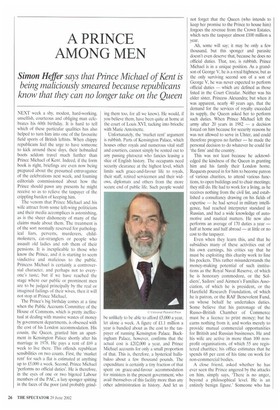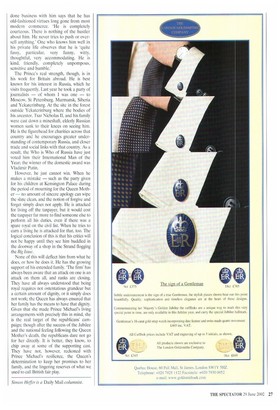A PRINCE AMONG MEN
Simon Heifer says that Prince Michael of Kent is
being maliciously smeared because republicans know that they can no longer take on the Queen
NEXT week a shy, modest, hard-working, unselfish, courteous and obliging man celebrates his 60th birthday. It is hard to tell which of these particular qualities has also helped to turn him into one of the favourite field sports of British leftists. When chippy republicans feel the urge to have someone to kick around these days, their hobnailed boots seldom travel much further than Prince Michael of Kent. Indeed, if the form book is right, briefings are even now being prepared about the presumed extravagance of the celebrations next week, and foaming editorials commissioned about how the Prince should pawn any presents he might receive so as to relieve the taxpayer of the crippling burden of keeping him.
The venom that Prince Michael and his wife attract from some left-wing politicians and their media accomplices is astonishing, as is the sheer dishonesty of many of the claims made about them. The treatment is of the sort normally reserved for pathological liars, perverts, murderers, childmolesters, cat-stranglers or people who assault old ladies and rob them of their pensions. It is inexplicable to those who know the Prince, and it is starting to seem vindictive and malicious to the public. Princess Michael is certainly a controversial character, and perhaps not to everyone's taste; but if we have reached the stage where our public or prominent men are to be judged principally by the real or imagined failings of their wives, then it will not stop at Prince Michael.
The Prince's big birthday comes at a time when the Public Accounts Committee of the House of Commons. which is pretty ineffectual at dealing with massive wastes of money by government departments, is obsessed with the cost of his London accommodation. His cousin, the Queen, granted him an apartment in Kensington Palace shortly after his marriage in 1978. He pays a rent of £69 a week to live there. This offends republican sensibilities on two counts. First, the 'market rent' for such a flat is estimated at anything up to £5,000 a week. Second, Prince Michael 'performs no official duties'. He is therefore, in the eyes of one or two bigoted Labour members of the PAC, a lazy sponger spitting in the faces of the poor (and probably grind
ing them too, for all we know). He would, if you believe them, have been quite at home at the court of Louis XVI, tucking into brioche with Marie Antoinette.
Unfortunately, the 'market rent' argument is rubbish. Parts of Kensington Palace, which houses other royals and numerous vital staff and courtiers, cannot simply be rented out to any passing plutocrat who fancies leasing a slice of English history. The occupants need security clearance at the highest level, which limits such grace-and-favour life to royals, their staff, retired servicemen and their widows, diplomats and others from the more secure end of public life. Such people would be unlikely to be able to afford £5,000 a year, let alone a week. A figure of £1.1 million a year is bandied about as the cost to the taxpayer of running Kensington Palace. Buckingham Palace, however, confirms that the actual cost is £202,000 a year, and Prince Michael accounts for only a small proportion of that. This is, therefore, a hysterical hullabaloo about a few thousand pounds. The expenditure is certainly a tiny fraction of that spent on grace-and-favour accommodation for ministers in the present government, who avail themselves of this facility more than any other administration in history. And let us not forget that the Queen (who intends to keep her promise to the Prince to house him) forgoes the revenue from the Crown Estates, which nets the taxpayer almost £100 million a year.
Ah, some will say; it may be only a few thousand, but this sponger and parasite doesn't even deserve that, because he does no official duties. That, too, is rubbish. Prince Michael is in a unique position. As a grandson of George V, he is a royal highness; but as the only surviving second son of a son of George V, he was never expected to perform official duties — which are defined as those listed in the Court Circular. Neither was his elder sister, Princess Alexandra; but when it was apparent, nearly 40 years ago, that the demand for the services of royalty exceeded its supply, the Queen asked her to perform such duties. When Prince Michael left the army after 20 years in 1982 — a decision forced on him because for security reasons he was not allowed to serve in Ulster, and could therefore progress no further — he made the personal decision to do whatever he could for 'the firm' and the country.
This was not least because he acknowledged the kindness of the Queen in granting him and his family their London home. Requests poured in for him to become patron of various charities, to attend various functions, to open buildings and to chair meetings; they still do. He had to work for a living, as he receives nothing from the civil list, and established a consultancy drawing on his fields of expertise — he had served in military intelligence, had reached interpreter standard in Russian, and had a wide knowledge of automotive and nautical matters. He now also performs an average of 170 duties a year — half at home and half abroad — at little or no cost to the taxpayer.
Even when they learn this, and that he subsidises many of these activities out of his own earnings, his critics say that he must be exploiting this charity work to line his pockets. This rather misunderstands the money-making potential of such institutions as the Royal Naval Reserve, of which he is honorary commodore, or the Soldiers', Sailors' and Airmen's Families Association, of which he is president, or the Harefield Research Foundation, of which he is patron, or the RAF Benevolent Fund, on whose behalf he undertakes duties. Some believe that his patronage of the Russo–British Chamber of Commerce must be a licence to print money; but he earns nothing from it, and works merely to provide mutual commercial opportunities for British and Russian businesses. He and his wife are active in more than 100 nonprofit organisations, of which 55 are registered charities; his office estimates that he spends 68 per cent of his time on work for non-commercial bodies.
A close friend, asked whether he has ever seen the Prince angered by the attacks on him, simply says, 'There is no anger, beyond a philosophical level. He is an entirely benign figure.' Someone who has done business with him says that he has old-fashioned virtues long gone from most modern commerce. 'He is completely courteous. There is nothing of the hustler about him. He never tries to push or oversell anything.' One who knows him well in his private life observes that he is 'quite fussy, particular, very funny, witty, thoughtful, very accommodating. He is kind, friendly, completely unpompous, sensitive and humble.'
The Prince's real strength, though, is in his work for Britain abroad. He is best known for his interest in Russia, which he visits frequently. Last year he took a party of journalists — of whom I was one — to Moscow. St Petersburg, Murmansk, Siberia and Yekaterinburg. At the site in the forest outside Yekaterinburg where the bodies of his ancestor, Tsar Nicholas II, and his family were cast down a mineshaft, elderly Russian women sank to their knees on seeing him. He is the figurehead for charities across that country and he encourages greater understanding of contemporary Russia, and closer trade and social links with that country. As a result, the Who is Who of Russia have just voted him their International Man of the Year; the winner of the domestic award was Vladimir Putin.
However, he just cannot win. When he makes a mistake — such as the party given for his children at Kensington Palace during the period of mourning for the Queen Mother — no amount of sincere apology can wipe the slate clean, and the notion of forgive and forget simply does not apply. He is attacked for living off the taxpayer, but it would cost the taxpayer far more to find someone else to perform all his duties, even if there was a spare royal on the civil list. When he tries to earn a living he is attacked for that, too. The logical conclusion of this is that his critics will not be happy until they see him huddled in the doorway of a shop in the Strand flogging the Big Issue.
None of this will deflect him from what he does, or how he does it. He has the growing support of his extended family. 'The firm' has always been aware that an attack on one is an attack on them all, and ranks are closing. They have all always understood that being royal requires not ostentatious grandeur but a certain amount of dignity, or it simply does not work; the Queen has always ensured that her family has the means to have that dignity. Given that she made Prince Michael's living arrangements with precisely this in mind, she is the real target of the republicans' campaign; though after the success of the Jubilee and the national feeling following the Queen Mother's death, the republicans dare not go for her directly. It is better, they know, to chip away at some of the supporting cast. They have not, however, reckoned with Prince Michael's resilience, the Queen's determination to keep her promises to her family, and the lingering reserves of what we used to call British fair play.
Simon Heifer is a Daily Mail columnist.



































































 Previous page
Previous page